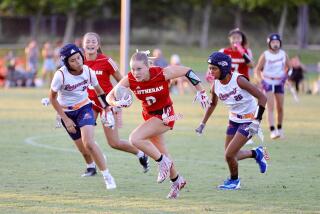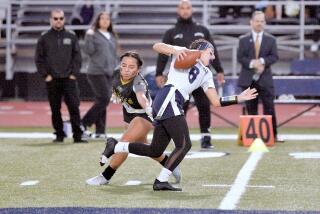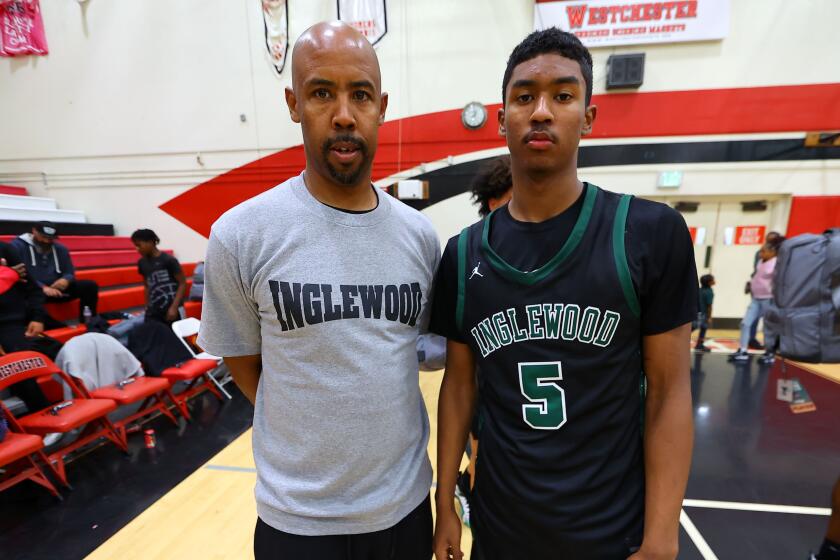Herb Hill Closes In on History : Prep Football: If Loara High School’s football team wins tonight it will give the veteran coach the Orange County record for career victories.
ANAHEIM — The year was 1961, and a bright, young, but out-of-work football coach looking for a job and some career advice drove past the orange groves to see Coach Clare VanHoorebeke at Anaheim High School.
To the young man’s way of thinking, VanHoorebeke was the man to see.
VanHoorebeke was on his way to winning an Orange County-record 190 games (he lost 49 and tied 10) in 23 seasons at Anaheim. His 1956 team had tied Downey for the Southern Section 4-A title, a game that drew a record crowd of 41,383 to the Coliseum.
There was no job awaiting the visitor in 1961, no pearls of wisdom for VanHoorebeke to give. It was just the county’s most accomplished coach giving a confidence-boosting session to a young man who was eager to follow in his footsteps.
That young man was Herb Hill.
A year after their meeting, Hill landed the head football coaching job at a new school called Loara, a couple of miles from Anaheim.
Tonight, with a victory over El Dorado, Hill, a man with a simple program and a handful of talented players, will break VanHoorebeke’s county record for victories.
Hill, 59, is retiring from coaching at the end of the season, making tonight’s game, his regular-season finale, extra special. Loara players and boosters from the past 28 seasons are expected to fill the stands tonight at Western High.
Harvey Winn, a member of the Loara class of 1968 now living in Beaverton, Ore., will be there with his father. “I’ve been planning this for a long time,” said Winn, a quarterback on the 1966 and ’67 teams.
Karyn Hill will be there, as she has for every game for the 14 years she has been married to Hill. “He is the wind beneath my wings,” said Karyn, who was so overcome by Loara’s Southern Conference championship victory in 1979, she fainted right there in Anaheim Stadium.
Coy Collins, a senior running back who wears No. 34, will be there, too, trying to make sure Hill gets victory No. 191. “We’ve been having a countdown, now there’s one game left,” Collins said.
Tonight, they will gather to honor Hill and his commitment. To winning? Yes. But more to his pursuit of victories, because how Hill’s teams win has always been more important than the act itself.
Beneath the tan, friendly smile, white hair and wire-framed glasses is a fierce, competitive spirit. But Hill has keep it under restraint and it has never gotten the best of him. To his peers, he is known as a good man, unspoiled by success.
“I have a list of about three coaching heroes,” said John Barnes, who has coached against Hill for 14 seasons at Los Alamitos and Cypress. “Now that Herb is retiring, he’s got to be on there, too.”
With the record almost in hand, the pupil is about to pass the teacher. And it gives Hill pause to think back to 1961, when he was a young man trying to make his mark in the coaching ranks.
“When I was seated in front of Van, I never dreamed I’d win as many games,” Hill said.
Herb Hill was born and raised in Santa Ana, the only child of Herbert and Sara Hill. His father owned a clothing store in town and served on the city council for a time.
Hill played football at Santa Ana High, graduating in 1948. He spent two seasons playing for Bill Cook at Santa Ana College (now Rancho Santiago) and was a lineman on the Dons’ 1949 Junior Rose Bowl team.
He finished his football career at Occidental College and returned to Orange County to begin coaching. His first job was as an assistant at Garden Grove in 1953. In 1956, Hill got his first head coaching job, taking the position at Rancho Alamitos.
After three seasons, Hill was gone, moving to Orange Coast College as an assistant to Steve Musso. He spent the 1960 season there, but was gone in a flash. A feud developed between Musso and the administration at Orange Coast. They couldn’t fire Musso, who had tenure, so they did the next best thing, they fired his staff, including Hill.
It was about this time that he called on VanHoorebeke. After their meeting, Hill decided to go back to school and earn his master’s degree at Cal State Long Beach.
When he was hired at Loara in early 1962, the first person he hired was his good friend Gib Dear. Dear and Hill had coached together since 1954. They went fishing together in Montana. Their families spent Christmas together. Dear was the brother Hill never had.
Hill’s coaching career seemed to be back on track. Then practice started.
Loara, like many new schools, opened with only a sophomore class. In 1962, the school was not built yet. Students went to class in the afternoons at Magnolia.
Since there was no place to practice at Loara and they couldn’t push Magnolia off its field, Hill looked for an alternate site and settled on La Palma Park.
The city of Anaheim ruled off a 50-yard practice field and the Saxons went to work beneath the palms.
“Gibby was ready to get in his pickup and go home,” Hill said. “He said, ‘Coach, I can’t do this.’ I had to convince him to stick it out.
“It was the (players’) first day out of junior high. The performance and maturity levels weren’t what we were used to.”
The seasons passed and Hill became more and more comfortable at Loara. “I didn’t come to stay forever,” he said. “Three years was the longest I had stayed anywhere. Moving along was part of being a coach.”
By 1966, the Saxons had their first standout player, quarterback Harvey Winn.
“He taught me not to make excuses,” Winn said of Hill. “He taught me if you don’t know what you’re doing, find out.”
Winn learned that lesson the second week of practice as a sophomore. Hill moved Winn from safety to cornerback for a scrimmage. When a play broke down, Hill asked Winn what happened. When Winn said he didn’t know, Hill kicked him off the field, telling him not to come back until he learned the position.
“I knew all the plays after that, whether it was my position or not,” said Winn, who went on to play behind Dan Fouts at the University of Oregon.
A year after Winn graduated, Loara won the Southern Section 3-A title, posting a 13-0 record. Hill calls that 1968 team his best ever. Running back Rick DeLisk was chosen Southern Section player of the year, the first and only Loara player to be so honored.
In 1979, Hill had another championship team. Loara defeated Canyon, 28-23, in one of the most thrilling Southern Conference title games ever played.
The Saxons trailed, 23-0, early in the second half. Bob Caffrey, their starting quarterback, had been injured early in the game and stood on the sidelines watching as the championship seemed to be slipping away.
But when the fourth quarter started, Caffrey was in the lineup and the Saxons rallied to win.
In the 1980s, Loara suffered through a series of mediocre seasons, going five consecutive years without winning a league title. But in 1986, the Saxons posted their best record in years, going 10-1-1 and winning the Empire League championship.
With Coy Collins rushing for 1,538 yards, the second-highest total in the county this season, Loara has compiled a 7-1-1 record and has clinched a spot in the Southern Section playoffs.
Indeed, Hill’s final season is turning out to be one of his finest.
It’s difficult to know whether Hill will be remembered more for being a good football coach or for being a good man.
Most likely he’ll be known for both.
“I just feel he’s the most ethical, well-respected football coaches that I’ve been associated with,” said Barnes, Los Alamitos’ coach for the past 11 seasons. “All young players and coaches need to look up to a guy like him. He’s always conducted himself in such a gracious and classy manner.”
Before Los Alamitos’ 16-14 victory over Loara this season, Barnes took a moment to tell this to Hill.
“We don’t have a nastiness to (our rivalry),” Barnes said. “It’s fun playing them. It’s a good game, a tough game every year. When it’s over, you want to go over and put your arm around him and say, ‘That’s the way it ought to be.’ ”
Hill’s teams have always been well-prepared and drilled in the fundamentals. He also has been able to mold the game plan to the talents of his players.
“One year they feature a Collins and they run,” Barnes said. “Another year a Caffrey and they pass. He’s always been smart enough to adapt. I don’t think a lot of coaches can do that.”
Hill’s coaching philosophy is simple, a reflection of the man.
“Kids like stability,” he said. “I think the kids like to know what the rules are. We run the same offenses and defenses on our freshman and sophomore teams as we do on the varsity.”
It’s the mark of a fair, honest man who cares more about those around him.
Hill once instructed a player, who didn’t own football cleats, to go to a local sporting goods store and pick out a pair, never mind the cost. The player never found out where the money came from but he had a good idea.
Then there was the time about five years ago that Hill honored his father before a game. It was Father-Son night and the stadium’s announcer introduced each player and his father and the two ran onto the field. Then he introduced Hill and his father and the two walked to midfield to a loud ovation.
Now, Hill is on the verge of his greatest honor, “a reward for hanging around,” he calls it.
“It’s nothing brilliant,” Hill said of his coaching. “That’s what I had Gibby around for.”
Hill and Dear worked together for 31 years. Then in 1986, Dear died of cancer.
“Coaching without him has been the most difficult thing I’ve had to face, without a doubt,” Hill said. “It was difficult to come to work that next year.”
Loara players wore patches on their uniforms with Dear’s initials for the 1986 season. In the years that followed, the patches disappeared as the school ordered new uniforms.
Knowing this was to be his last season, Hill ordered new patches and the players all wear them in honor of Dear.
“He misses Gibby so much,” Karyn said.
Hill has pressed on, though. If anything, that has been his trademark.
Tonight is the final step for Hill. He’s nearing the end of a great coaching career.
“If we win Thursday night, he’ll be very happy,” Karyn said. “He might have an extra Scotch. I can’t imagine him reacting to it any differently. I think he’ll be very proud.”
More to Read
Get our high school sports newsletter
Prep Rally is devoted to the SoCal high school sports experience, bringing you scores, stories and a behind-the-scenes look at what makes prep sports so popular.
You may occasionally receive promotional content from the Los Angeles Times.






